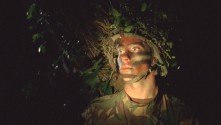
Drifting, Dreaming. The Nocturnal Cinema of João Pedro Rodrigues
One of the rising stars of contemporary Portuguese cinema, João Pedro Rodrigues (b. 1966) has directed three quietly mesmerizing feature films that explore the mysteries of human desire and sexuality, placing him at the vanguard of emerging European auteurs. Rodrigues furthers the deep-rooted tradition of avant-garde narrative film long nourished by Portuguese cinema by embracing a mode of formally rigorous and poetically elliptical cinema that complements the radical filmmaking pioneered by Manoel de Oliveira and Pedro Costa, both subjects of recent HFA retrospectives. At the core of Rodrigues’ cinema is an abiding fascination with the musical patterns of ambiguously shifting genders and polymorphous sexuality, a curiosity about the body as the stage for the dramatic theater of sexual identity that found first expression in his striking and controversial debut film, Phantom. Rodrigues’ latest feature, the Cannes favorite To Die Like a Man, offers a sustained and lively interrogation of the meaning and mutability of gender set within the backstage world of drag queen performers.
A graduate of the Lisbon Film School who originally trained as an ornithologist, Rodrigues has defined an austerely classical style whose eschewal of elaborate editing schemes and camera movement gives propulsive energy to the often-baroque and larger-than-life subject matter of his films. Making strikingly balanced and precise use of light and color, music and silence, Rodrigues’ films share a deceptively calm surface that partially and provocatively cloaks rich, hidden facets, including the deep strains of perverse sexuality and violent behavior that suddenly erupt to lead his protagonists on strange detours from their empty lives. Like Claire Denis and Tsai Ming-liang, Rodrigues mines a vein of contemporary art cinema that intermingles the bleak and the heartfelt, the shockingly abrasive and the disarmingly comic. Yet despite the frequently astringent harshness and even cruelty of his work, Rodrigues carefully avoids exploiting either his audience or his characters and instead creates films that seem equally puzzled and fascinated by the profoundly tragicomic enigma of sexuality and gender.
For the first American retrospective of his work, the Harvard Film Archive is proud to welcome both Rodrigues himself and his frequent collaborator (as actor, production designer and co-director) João Rui Guerra da Mata.











